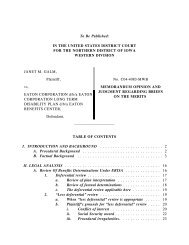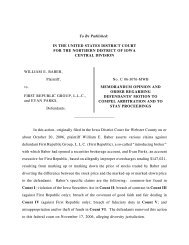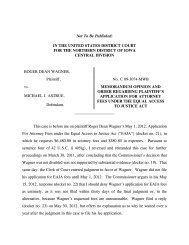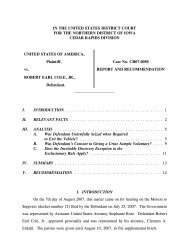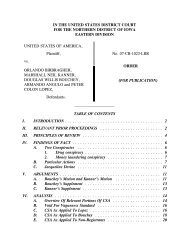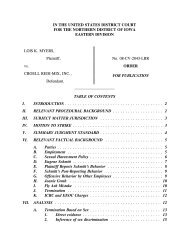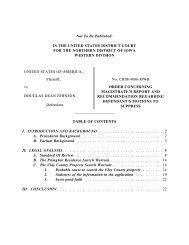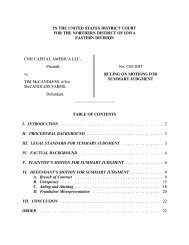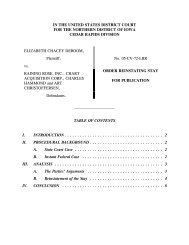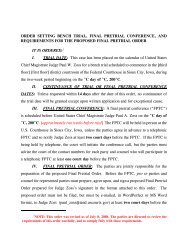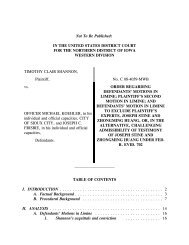Arnzen v. Palmer - Northern District of Iowa
Arnzen v. Palmer - Northern District of Iowa
Arnzen v. Palmer - Northern District of Iowa
You also want an ePaper? Increase the reach of your titles
YUMPU automatically turns print PDFs into web optimized ePapers that Google loves.
prior to trial is “because there is cause to believe that they are<br />
dangerous.” Johnson-El v. Schoemehl, 878 F.2d 1043, 1048<br />
(8th Cir. 1989). For example, under the Bail Reform Act <strong>of</strong><br />
1984, individuals charged with federal criminal <strong>of</strong>fenses shall<br />
be detained prior to trial if “no condition or combination <strong>of</strong><br />
conditions will reasonably assure . . . the safety <strong>of</strong> any other<br />
person and the community.” 18 U.S.C. § 3142(e)(1).<br />
Similarly, commitment under Minnesota law as a sexually<br />
dangerous person “requires a finding <strong>of</strong> future<br />
dangerousness.” Hince v. O’Keefe, 632 N.W.2d 577, 581<br />
(Minn. 2001) (quotation omitted). An individual committed as<br />
a sexually dangerous person in Minnesota is, by statutory<br />
definition, “dangerous to the public.” Minn.Stat. § 253B.02,<br />
subdivs. 17, 18(c).<br />
Although decided under the Due Process Clause <strong>of</strong> the<br />
Fourteenth Amendment, another Supreme Court case,<br />
Youngberg v. Romeo, 457 U.S. 307, 102 S. Ct. 2452, 73<br />
L.Ed.2d 28 (1982), further supports application <strong>of</strong> the<br />
pretrial-detainee standard in Serna’s case. There, the Court<br />
considered the constitutionality <strong>of</strong> the conditions <strong>of</strong><br />
confinement for an involuntarily committed, mentally disabled<br />
man. Youngberg, 457 U.S. at 309, 102 S. Ct. 2452. In its<br />
analysis, the Court stated, “Persons who have been<br />
involuntarily committed are entitled to more considerate<br />
treatment and conditions <strong>of</strong> confinement than criminals whose<br />
conditions <strong>of</strong> confinement are designed to punish.” Id. at<br />
321-22, 102 S.Ct. 2452. After determining that the<br />
involuntarily committed, mentally disabled man retained<br />
constitutionally protected liberty interests, the Court<br />
considered whether the infringement upon his liberty interests<br />
violated due process. Id. at 319-23, 102 S.Ct. 2452. The<br />
Court drew an analogy between pretrial detainees and civilly<br />
committed persons as two groups that could be subjected to<br />
liberty restrictions “reasonably related to legitimate<br />
government objectives and not tantamount to punishment.” Id.<br />
at 320-21, 102 S.Ct. 2452.<br />
7



